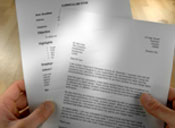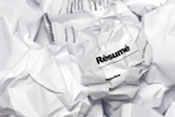The Perfect Way to Introduce Your Resume
By Lancelot Larsen
|
|
 | |
| A cover letter gives you an opportunity to explain all the details of your situation that a resume doesn't give you a chance to do. |
Your cover letter is the greatest hits of your legal resume. You want to select all the best things from your resume and package them in your cover letter in a way that makes employers think they are hearing all the songs they want to hear without sifting through the archives.
Your cover letter also provides an opportunity to say everything that can't be said in your resume. It is here where you can tell the employer why you are looking for work, why you moved to another state, or why you have not worked in several years.
Before you write your cover letter, remember to keep it to one page. Busy employers and recruiters will not read text that sprawls longer than three-quarters of a page. The strength of your cover letter is in the detail you provide and the language you use. Take your time. Be yourself and professional, but don't be too informal or send something that reads like a computer program spit it out of your printer. Charm the employer with your personality as well as your skills.
Formatting
Make sure the general look of the cover letter matches the resume. Your name and contact information at the top should appear exactly as it does on your resume. While the font size doesn't need to be consistent between your resume and cover letter, it's essential that the font type is. If you use a 10.5 font size in your resume to accommodate all your experience on one page, you don't need to make the employer squint when reading your cover letter. The margins should be the same for both documents, and the text should be justified. The text should also be arranged in a block style. Write the date at the top left, use one space below, and then (one below the other) write the contact's name; his or her title; the company's name; the address; and the city, state, and zip code.
 | |
| Almost all resumes without cover letters are declined whether or not the cover letters are read. |
One or two spaces below the address, write "Dear Mr." or "Dear Ms." followed by the contact's last name and a colon. Never use the contact's first name, as it's too informal for your purposes. If you don't know the name of the person you need to address, write "Dear Hiring Manager" or something similar that is appropriate. You can use "Dear Sir/Madam," though it's considered overused. "To Whom It May Concern" can be considered slightly impertinent by some personalities. You'll go a lot farther with a name, but you can only do what you can do if it's simply not available.
First Paragraph
When writing a cover letter, view it as containing pieces of real estate. The prime real estate is the opening paragraph and the top third or half of the second paragraph. You should have three sentences in the first paragraph.
In the first sentence of the first paragraph, you should state who you are and why you are writing. If someone were to pull you aside and ask you to explain who you are as an attorney in one second, your answer should be in the first sentence of the first paragraph. Follow that thought with why you are writing (looking for opportunities with the firm or applying for a specific position).
The second sentence should be a snapshot of what you will bring to the firm. Definitely use "bring" or "offer" to start off the second sentence.
Open the third sentence with a brief mention of why you are looking for work (new challenges in the same practice or a practice change). Follow that thought with what you are doing: presenting your resume for review.
While this is the standard approach, feel free to mix it up depending on the circumstances. If you are applying for a specific job opening, you might want to add a line or dedicate the second sentence to why you are interested in that job. You can also communicate this at the beginning of the third sentence.
Second Paragraph
This is the most important paragraph and the most challenging to write. It is here where you want to sell yourself and summarize your experiences and skills without cutting and pasting from your resume. Remember that the top two sentences are the most critical (your prime real estate). Assume that the employer might only read the top part of this paragraph and skim or skip the rest. So start the second sentence off with a bang.
Typically, if you are looking for work in the same practice area, you'll want to start off with what you are doing now (or what you have done most recently) and tell the employer what skills you provide your current employer.
If you used to work in general liability litigation and now do marital law but want to go back to liability litigation, you'll want to mention what you are doing now at the end of the second paragraph. This is a good idea because you want to play up your liability experience up front, where the most attention will be. You can finish the paragraph with a casual mention of what you are doing now. There's no need to belabor the point if your current position has little or nothing to do with where you want to go.
Moreover, in the second paragraph you'll want to list all your best and most relevant accomplishments from your current and/or previous firms or companies (and internships and volunteer work, if necessary). If you are responding to a job posting, the second paragraph should reflect what the position requires as much as possible.
Just remember that your cover letter is a way of telling the employer what you can do for him or her. Do not write it like a biography. If you have a lot of skills and accomplishments to list, it wouldn't hurt to bullet them for clarity.
Always mention any shining moments of glory in your career. If you oversaw a multimillion-dollar transaction for Singapore Air, mention that in the second paragraph of your cover letter. Even if you have a strictly retail background and just got your J.D., it won't hurt to mention how you helped win the Reader's Advantage sales contest for your Barnes & Noble outlet.
Third Paragraph
Depending on your situation, you could or could not do with a third paragraph. While you want to submit a substantial cover letter, know that employers pressed for time in reviewing submissions will appreciate a short letter. Also, it's more than likely that your cover letter will not get read completely, so be mindful as to its length.
As a rule, including a third paragraph is a good way to summarize your skills indirectly stated in the second paragraph and lead into the conclusion. Two solid sentences that clearly state your managerial, communication, interpersonal, and negotiation skills (or your capacity for being detail oriented or adhering to a strong work ethic) will suffice.
If you are a law student or recent graduate, you may want to use the second paragraph for your work experience and the third paragraph to discuss how your academic achievements will benefit the firm. This will help if you don't have a lot of experience to complete a substantial second paragraph.
You can also use the third paragraph to state things that you want the employer to know about issues such as relocations or gaps in work history. Foreign professionals can use this paragraph as a good, discreet place to mention citizenship, work permit, or visa issues.
Fourth Paragraph
This paragraph should only be two sentences long and is the least of your worries. Most employers will barely glance at this part of the cover letter. The first sentence should tell the employer that you are interested in an interview. The second sentence should thank the employer for reading your letter and express enthusiasm in awaiting a response.
You don't need to provide a phone number or email address since it should be at the top of your cover letter in the first place. The only time you would add anything else to this part of the cover letter is if you want the employer to know that you are keeping your search confidential. This should be stated before the "thank you" part at the end.
Signature
Ideally, write "Sincerely" and type your name three spaces below to allow room for your signature. "Respectfully yours" and "Best regards" will work as well. Use one space below your name and write "Enclosure" to refer to your resume. This will indicate good attention to detail on your part.
Tips
- Write a list of the top five reasons that you should be working for the firm or company and refer to it when composing the second paragraph of the letter.
- If you are responding to a specific job posting, write out every requirement you meet and include what you've written in the second paragraph of the letter. If there's a requirement you don't meet, suggest how you can master it.
- Research the firm or company and learn about its goals and culture. Review company websites and brochures. Visit a library or career center.
- Use positive, confident language. Avoid anything that sounds negative.
- Never use "if," "but," "or," and "although."
- Replace "would" with "will."
- Never say "might."
- "Offer," "provide," and "bring" should each be in your letter. These are words that sell.
- Don't use clichés, and avoid wordiness.
- Make sure your cover letter does not repeat your resume word for word.
- Revise your cover letter for each submission.
- Reread your cover letter with the eyes of an employer. Then ask a friend to read it.




